INCREASING HOTEL PROFITABILITY AND EFFICIENCY
CHAPTER 6
How to Optimize Hotel Operating Costs for Better Margins
Rising energy costs, inflation, and an ongoing staffing shortage in the hospitality industry make it difficult to protect your bottom line.
Sourcing employees you can trust is expensive and time-consuming. And when you’re short-staffed, guests may begin to notice hiccups in your operations, which can in turn create friction with your team and lead to negative reviews. This all adds pressure and stress to your day-to-day and ultimately affects business results
These issues are a major driver of modernization across the industry, as hotels are increasingly turning to tech solutions that help automate key processes while meeting the modern guest’s expectations of a more digital experience.
By following proven strategies for reducing hotel operating costs, you can protect your profits and boost your total revenue while upholding an exceptional guest experience.
Optimize scheduling, increase guest autonomy, and keep your operating costs at a minimum with Operto.
Addressing the inefficiencies that compress your margins
The best strategies for optimizing operating expenses focus on tracking where you’re spending, cutting unnecessary costs, and using specialized software to automate processes where you can. The following techniques will help you get a closer look at where you can eliminate the operational inefficiencies that cut into your profits.
We’ll be looking at both fixed expenses, which tend to be steady over time, as well as variable costs, which fluctuate along with business activity. For a deeper look into these two types of operating expenses, see our overview in the FAQ section at the bottom of this article.
Track your team’s productivity and performance
John Ryan, owner and managing director of The Ardilaun Hotel, warns that “the biggest cost in your hotel business is probably your labor. That needs to be controlled or you can end up wasting a lot of money.”
If you don’t know how efficient your staff is, it’s hard to know where you can improve productivity and optimize labor costs. That’s why it’s essential to find a way to track productivity and performance.
You can do this with a time-tracking tool that generates reports on the productivity of each of your housekeepers. That way, you know which employees are setting the standard for quality and productivity, and which are falling behind.
For example, Operto Teams offers a robust time-tracking solution that uses GPS to prove employees are onsite when they clock in. It also generates detailed pay reports that show which housekeepers are the most productive, which you can run alongside their clean ratings.
This will give you a clear picture of where the fastest workers may be cutting corners or where others need to be more efficient. With this information, you can make data-informed decisions about how to best support and optimize your team to improve performance and reduce costs.
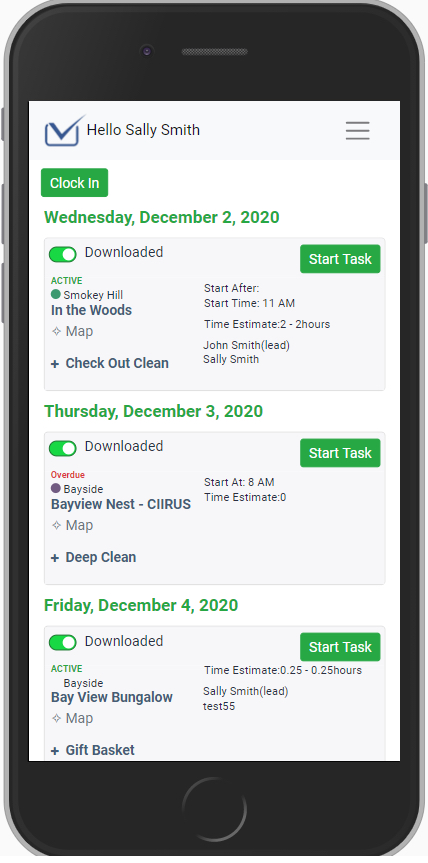
Collate data on in-room spending
Room supplies, like toiletries and instant coffee packets, can add up to be a significant variable operating cost when left unchecked. These expenses often go untracked, but with an easily accessible record of what and how much stock is used, you can identify the source of losses and make informed choices on your in-room spending.
To track these expenses, use housekeeping software like Operto Teams to create a checklist for cleaners to record what stock they’re replacing during a turnover. Then, use this information to run a report and dig deep into your costs so you can determine how to reduce them.
For example, if you discover you’re constantly having to replace all the TAZO tea bags during turnovers, switching to Lipton could mean considerable savings over time without having a significant impact on the guest experience.
Reassess and consolidate your tech stack
While tech solutions are essential to running a modernized hotel operation, your software tools need to continually provide value for what you’re spending on them. So it’s key to periodically review your tech stack and check whether you’re actually using all the subscriptions you’re paying for.
The key here is prioritization and consolidation. First, determine which tools are the most important for your operations, and closely measure up your hotel management software advantages against their costs. You want to prioritize tools that help you reduce workload, make your communications and management easier, and enhance the guest experience.
Additionally, you should look to centralize your solutions whenever possible. This helps streamline all your management and communication processes, making them simpler and less stressful to operate.
For example, Operto is equipped with an all-in-one dashboard that lets you keep track of keyless access, communicate with your team and guests, monitor in-room noise levels, automate energy use based on your PMS’s booking details, and view occupancy, all in one place.
Finally, be sure to use tools your whole team can make the most of. Rut Morales Archs, an experienced hotel and hospitality operations manager who we spoke with as a part of ongoing research into the operational challenges facing hotels, says “it’s important to use systems that are simple enough for everyone to understand, from your housekeepers to your restaurant staff.”
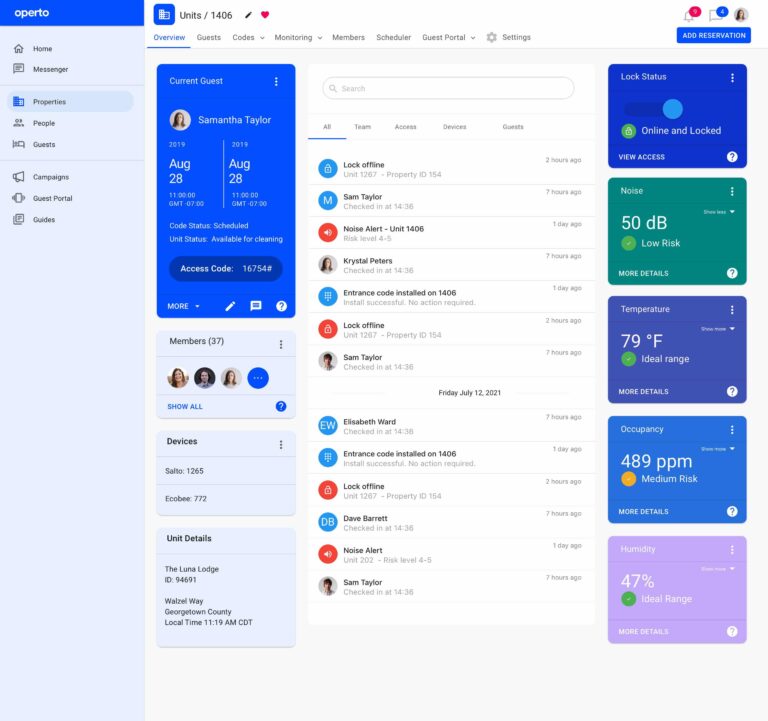
Use a revenue management tool
Revenue management tools are indispensable for optimizing operating costs at your hotel. While this software is mainly used to optimize room revenue with dynamic pricing, it can also be used to help forecast expenses.
For example, you can use a solution like Duetto or Atomize to get detailed forecasts so you can effectively plan out your expenses and create an accurate budget.
When you have all the information you need in a report right in front of your eyes, you don’t have to make budgeting decisions based on what you think will happen, and instead use hard data to plan your staffing and stocking according to the anticipated upcoming demand.
Reduce your energy bill
The average hotel in the United States spends nearly $2,200 annually on energy per available room. If you can find a way to reduce this even slightly, the savings can quickly have a significant impact.
Your energy bill may fluctuate throughout the year, but you can still take steps towards keeping it as low as possible by using the right tools.
First off, use smart thermostats to set ideal temperatures during occupancy and lower heating or cooling when rooms are vacant. That way, you don’t have to worry about a guest cranking up the heat and leaving it on after they check out—you can control temperature levels remotely and automatically based on your latest booking information.
Equally, a control system for your boilers will help increase energy efficiency by ensuring they only kick in when needed.
With rising energy costs, taking these measures can help protect your margins, as well as appeal to the modern guest who places value on sustainability when making their booking choices.
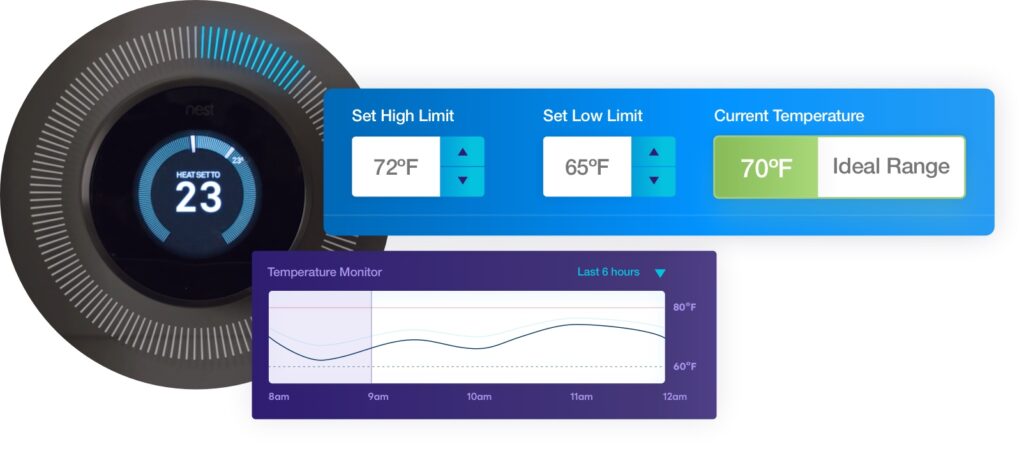
See maintenance costs as an investment
If you don’t want to pay more in the long run, don’t cut corners on maintenance. To begin, use a streamlined internal maintenance reporting system that helps your team track and alert issues so they can be addressed as quickly as possible.
For example, Operto Teams lets your cleaning staff easily create an alert when they encounter a maintenance issue during a turnover. This notification is directed to your maintenance manager, who can ensure the issue is prioritized instead of getting buried in a flurry of group chat messages.
Also give importance to regular maintenance to avoid costly issues that could escalate over time. So even if your heating system seems to be working properly, periodic maintenance will ensure that it’s operating as efficiently as possible to help with those cumulative energy savings.
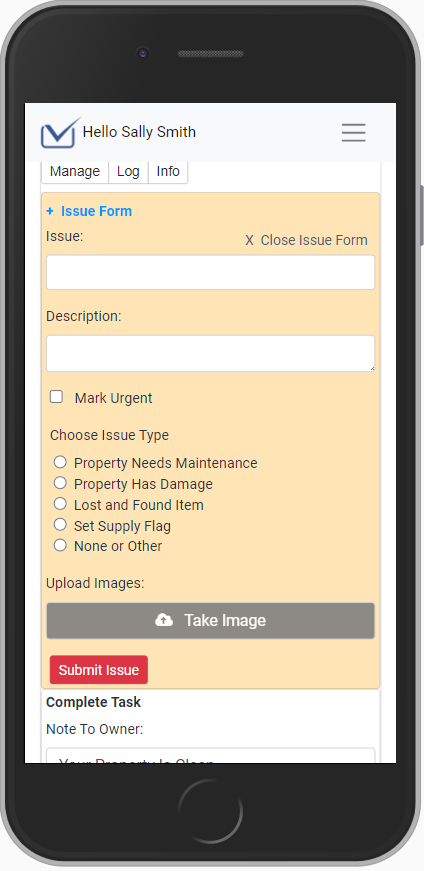
Optimize your direct booking website and marketing strategies
Relying on OTAs as a marketing strategy can impact your profits (because of their commission rates) and in some cases create occupancy issues, too—it’s not uncommon to see a higher rate of cancellations with OTA bookings, which is why you want to bring in as much business as possible through your direct booking website.
Your website and direct booking marketing strategies can help reduce your operating costs and give you more security around reservations in the long run.
Be sure you have a way to collect guest email addresses, and create a post-stay email marketing message flow to bring in repeat guests via direct bookings.
Automate operations wherever possible
Replacing and updating manual processes is crucial to reducing your operating costs. Automating the key elements of your business practices, from hotel guest communication to check-in and room access, helps you reduce staffing costs and run a more cost-effective operation.
With an automated scheduling tool like Operto Teams, you can ensure your staff is working as productively as possible with features like a shared calendar and route optimization, as well as detailed reporting.
And when you automate parts of the guest journey that previously required staff interactions, like check-in and check-out, you can significantly reduce labor costs at the front desk.
To do so, you’ll need smart locks that provide keyless access. Fortunately, you don’t have to overhaul all your doors to make this possible.
Operto Boost offers an affordable way to implement keyless access by upgrading your existing locks instead of replacing them, Operto’s revolutionary technology is powering the digital key program for small independent hotels and international hotel groups such as Accor.
Take Prague Residences as an example of how automation and a digital front desk can significantly reduce your operating costs: With the help of Operto’s solutions, the accommodation provider was able to go from four front desks to one and reduce their monthly operating expenses by $10,000.
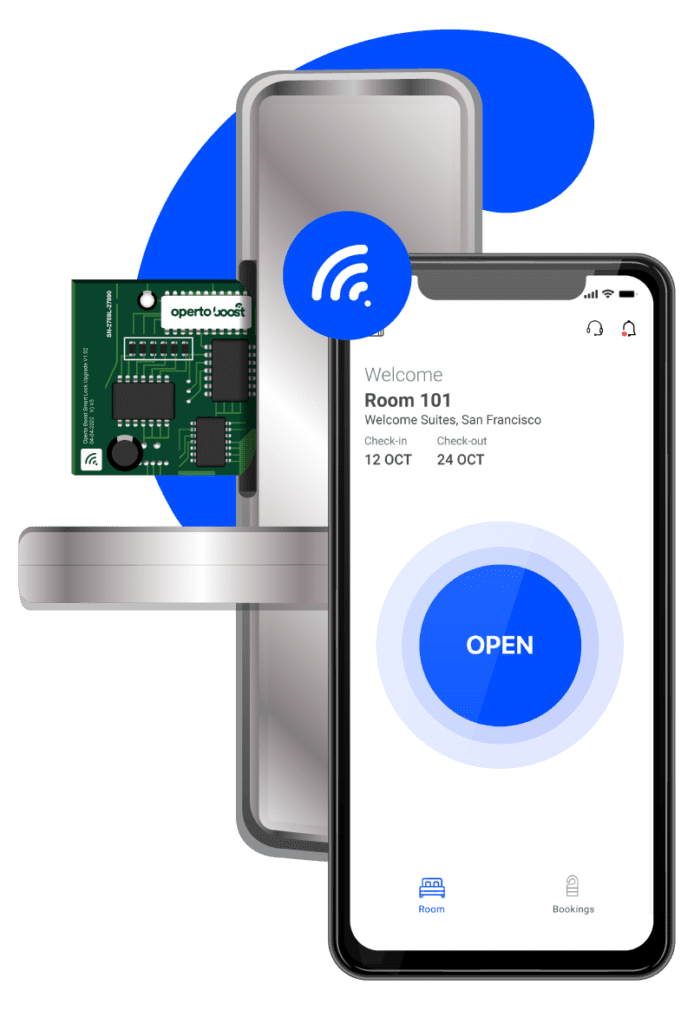
Get a handle on your operating costs and boost your bottom line
If you want to increase hotel profitability, you need to keep a close eye on your operating expenses and take measures to keep them as low as possible. The good news is that this approach isn’t just good for your bottom line—it’s good for your guests and your staff.
Says John Ryan of The Ardilaun Hotel: “A happy team is much more productive, and will stay with you longer. Because the most expensive thing you can do is hire a new person.”
Lowering your costs through automation and the other strategies discussed in this article will have a positive impact on team morale, in turn leading to lower staff turnover, and reduced employee onboarding expenses.
And when you cultivate a team of happy, experienced employees who are with you for the long haul, the guest experience benefits as well.
Optimize scheduling, increase guest autonomy, and keep your operating costs at a minimum with Operto.
Frequently asked questions about hotel operating costs
What are hotel operating costs?
Hotel operating costs are any expenses that are necessary for running your business, from utility expenses to labor costs. These expenses can be divided into fixed costs and variable costs. Controlling hotel operating costs is essential for maximizing profit margins and keeping your business afloat.
What are the different types of operating costs for hotels?
Operating costs for hotels can be divided into fixed and variable costs: The former remains constant over time and the latter changes depending on business volume.
Fixed operating costs
The fixed costs at your hotel may change periodically, but they aren’t influenced by daily activity. For example, cleaning supplies are not fixed costs, because they vary depending on occupancy rate and the number of turnovers you have.
Take a look at some of the fixed costs at hotels that won’t change based on business volume:
- Rent/mortgage: While your mortgage may fluctuate or you may see increases in rent, these costs remain the same regardless of business activity.
- Interest on loans: The same goes for interest on loans—you can have a clear idea of how much interest you’ll pay regardless of business volume.
- Property taxes and insurance: You can expect to pay the same amount for these expenses regardless of how many bookings you’re getting.
- Payroll for salaried employees: Because their pay doesn’t fluctuate based on the hours they work, payroll for salaried employees is a fixed cost.
- Employee health premiums: When you pay healthcare premiums for your staff, you can easily calculate how much this annual expense will be.
- Fixed telephone, internet, and cable plans: Regardless of whether your hotel is at full occupancy or half vacant, you still have to pay your telephone, internet, and cable bills.
- Annual maintenance fees: Regular scheduled maintenance like HVAC system servicing and plumbing checks are a fixed expense.
- Software subscriptions: Don’t forget to factor in what you pay for your PMS, revenue management tool, CRM, and any other software you use.
- Renovations: Even if things aren’t broken, renovations are an important expense to factor into your operating costs. For example, upgrading your RFID locks to Bluetooth-enabled locks with a program like Operto Boost to keep your hardware and systems ahead of the game.
Variable operating costs
Variable costs are harder to predict, as they fluctuate depending on occupancy rate, time of year, and other factors. So while payroll for salaried employees is a fixed cost, your labor expenses for hourly employees are a variable expense, as their schedules are affected by business volume.
The following are examples of variable costs at your hotel:
- Payroll for hourly employees: The wages for your cleaners will be a variable expense because how much they work depends on business volume.
- Linen cleaning: How much linen needs cleaning depends on how many rooms are occupied (and how many turnovers take place).
- Toiletries and other guest supplies: Again, guest supplies will vary depending on the occupancy rate.
- Cleaning supplies: How much you spend on cleaning supplies can vary significantly between the off-season and peak season
- Food and beverage expenses: This will also vary depending on business volume, as well as whether there are special events taking place (like a wedding or conference).
- Reservation fees: Your number of OTA bookings will directly impact your total reservation fees.
- Credit card commissions: How guests choose to pay results in another variable expense.
- Energy bills: Especially if you’re located in an area with a more extreme climate, you can expect energy bills to fluctuate throughout the year based on occupancy.
Optimize scheduling, increase guest autonomy, and keep your operating costs at a minimum with Operto.
